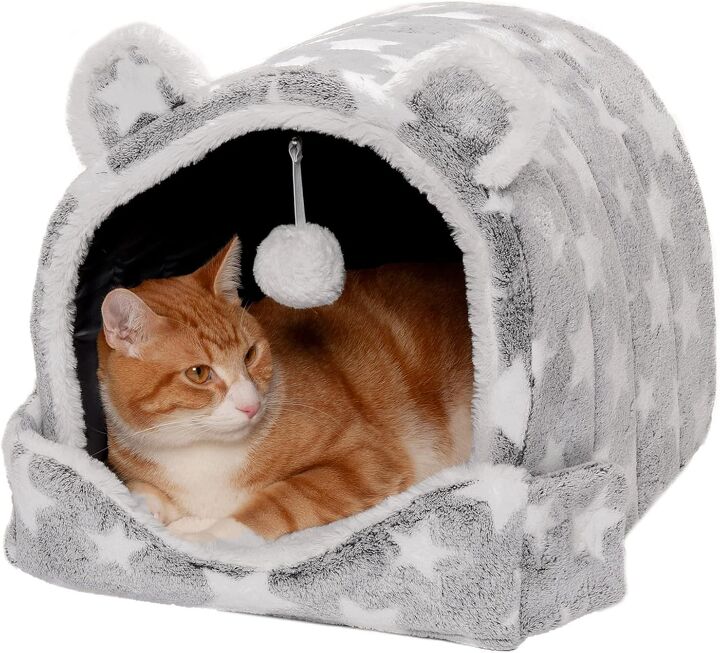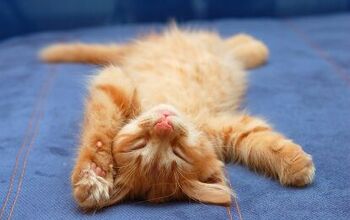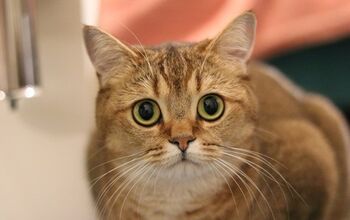How Much Do Cats Sleep?

Cats are known for sleeping through most of the day, but how long do cats sleep, exactly? How many hours per day can you expect your kitty to be sleeping, and what is considered a normal amount of sleep for cats of different ages, from kittens to seniors? We’ve got you covered with answers to all of these questions so you can get to know your feline companion even better.
Remember: if you are concerned about how much your cat is napping or how many hours they spend sleeping every day, talk to your veterinarian, who is the best resource for information about your unique pet and their health and needs.
How Many Hours Do Cats Sleep?
On average, cats will sleep anywhere from 12 to 18 hours per day. Of course, this will vary between individuals, so one cat might average around 15 hours of sleep every day while another might spend even more time, or less time, sleeping. And you might hear them snoring or see them twitching while they’re dreaming and in a deep sleep. So, be sure to give your feline friend plenty of comfy places to sleep, such as the Furhaven Fleece Snuggle Hideout Pet Bed that will help them get the rest they need without being disturbed.
Although cats sleep the majority of the 24 hours in a day, they won’t sleep for, say, 15 hours straight through. Instead, they’ll sleep many times throughout the day and night. For instance, a cat might sleep for a couple of hours in the morning before waking for food and playtime, and then nap for an hour or less before waking up again for more activity. Again, sleep patterns and nap lengths depend on the individual kitty, but the point is that, over the course of 24 hours, a cat will end up napping so many times that it adds up to an average of 15 hours of sleep.
Like people, a cat won’t sleep the exact same number of hours from one day to the next, and there are various factors that can influence how much a kitty sleeps on any given day. Also, kittens and older cats tend to sleep more than adult cats (more on that below), and illnesses or stress can also increase the amount of sleep your pet needs.
Worth noting, too, is that cats are crepuscular, which means they are the most active during dusk and dawn, when they would normally be hunting their favored prey if they were living on their own in the wild. This doesn’t mean that your cat will sleep the entire day away or spend all night sleeping and only be awake at dawn and dusk, but rather that they may have the most energy when the sun goes down and when it comes up.
Note: If your cat is sleeping too much or too little, contact your veterinarian, as there might be an underlying medical problem that needs to be addressed.
Tip: If your kitty is too active at night and wakes you up, there are ways to calm them and change their sleep schedule so you can sleep more peacefully.
Kittens and Senior Cats Sleep Even More
As mentioned above, age can play a role in how much your cat sleeps every day. Kittens and senior cats need more sleep than adult kitties. To keep them cozy and comfortable, you can let them sleep in an orthopedic pet bed like the Cozy Kiss Orthopedic Bed for Small Dogs & Cats.
Basically, growing kittens will sleep more while their bodies develop. On average, a very young kitten might sleep 20 or more hours a day. As they grow, they won’t need as much sleep. For example, by the time a kitten is older than 6 months of age, they might sleep around the same amount as an adult cat who’s 1 year or older.
Senior cats may exhibit behavioral changes that come with age, and they may slow down and sleep more than they did when they were younger. If your kitty is in their teens, they might sleep as much as 20 hours a day, spending less time active and more time resting.
Again, if you notice that your kitten’s or senior cat’s sleep quantity or patterns are changing and you aren’t sure if those changes are normal, talk to your veterinarian to rule out health concerns.
Why Do Cats Sleep So Much?
When surviving on their own, cats are hunters who need loads of energy for taking down prey, so they spend a lot of time sleeping to recuperate after a hunt and to build their energy for the next one. Your indoor kitty is no different, even though they don’t need to hunt for their food. Plus, in addition to being predators, cats are prey animals themselves, so they need to ensure they have enough energy to quickly perceive threats and protect themselves, too.
There you have it: cats aren’t lazy, they’re just built to sleep a lot. When awake, they’re full of energy and ready for action, and when they’re asleep, they peacefully snooze for hours.
Join the PetGuide community. Get the latest pet news and product recommendations by subscribing to our newsletter here.

Lisa Selvaggio is a freelance writer and editor, and our resident cats-pert, with certifications in pet nutrition and pet first aid. She enjoys producing content that helps people understand animals better so they can give their pets a safe and happy home.
More by Lisa Selvaggio

























